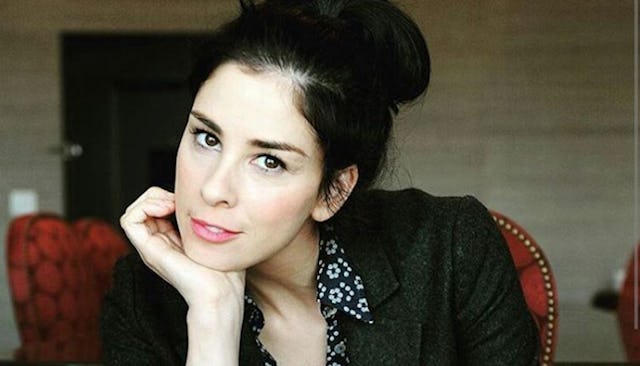Sarah Silverman Chose Her ‘Fullest Life’ Over Motherhood — And That’s Okay

Sarah Silverman gets real about her choice of career over motherhood
Effectively balancing career and children is a discussion working mothers have hashed, and rehashed, for decades. Comedian Sarah Silverman recently opened up about the double standard that exists in her industry and the struggle of balancing career and the possibility of motherhood.
For her, she explains, being a mom was not an option as a female comedian.
“As a comic always working & on the road I have had to decide between motherhood & living my fullest life & I chose the latter,” her Twitter thread began. “Men don’t have to do that. I’d so love to be a fun dad, coming home from the road & being my best fun dad self,” she tweeted on Monday to her 10.1 million followers. “So this is just a lil fuck all ya’ll because you can’t be a woman without sacrifice and that’s the fact jack.”
Though she has received a lot of backlash from some saying her comments are out of touch with today’s father and those working mothers that do manage career and children, she may not be that far off.
https://www.instagram.com/p/BHNNXXWD4CK/
A 2014 survey by Care.com found that one in four working moms cry once a week due to the stress of managing work and home. The study showed working mothers spend an “average of 37 hours per week working, yet spend more than double that amount of time (80 hours per week) on chores, childcare, and home responsibilities.” That is a big load to carry for any person. Not to say some women don’t have help or support, but moms still shoulder the majority of child care activities, even in households where two people work.
Couple that with the fact that being a working mother can make it more difficult to get ahead in your career, and it’s easy to see why some women like Silverman choose to stay childless. Pew Research found among working Millennial mothers (ages 18 to 32 in 2013), “58% say that being a working mother makes it harder for them to get ahead at work,” for reasons like maternity leave(s), child care interruptions, or a reduction in work hours as a result of having a child. Compare this to only 19% of Millennial fathers who feel it’s harder for them to advance at work. It’s not to say it can’t be done but we need real dialogue about the enormous sacrifices to both family and career placed on a working mother.
I enjoy having a career, the challenge and fact that it is something all my own. And I enjoy being a mother. But it has not come without sacrifice. There is constant guilt — when I’m here, I should be doing work. When I’m at work, I’m missing out at home. Years of trying, and failing, to divide up my time and energy so as few things fall through the cracks as possible. It’s a constant grind. To Silverman’s point, when I traveled extensively for my job, I heard all the time, “How can you be away from your children so much?” or “You shouldn’t be gone, your children need you.” My husband who also traveled? Never once. The narrative is different for women. Just because we want the dialogue to change doesn’t make it so.
Amy Westervelt brilliantly said, “Doing all of it at the same time was never the idea. By that definition, single working moms have been “having it all” for ages and yet society does not hold the single working mom up as the goal for women everywhere. No woman (or man, for that matter) ever said, hey, you know what would be great? If I could get up at 5 a.m., make breakfast for everyone, then get dressed (with heels, natch), drop my kids off at daycare, go to work for 10 hours, pick the kids up, come home, cook dinner, clean up, put the kids to bed, work in bed ‘til midnight so I don’t get behind at work, then do it all again tomorrow on 5 hours sleep.”
It’s hard. It’s not for everyone. That’s okay.
Silverman wasn’t “mother shaming,” she was simply saying that, for her, living life to the fullest meant not having kids. And there’s nothing wrong with that.